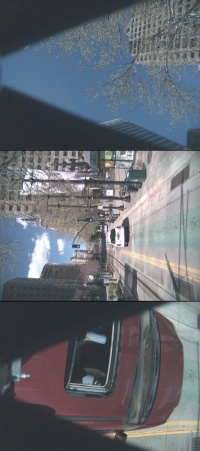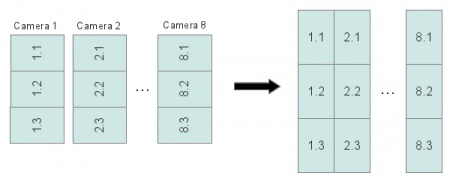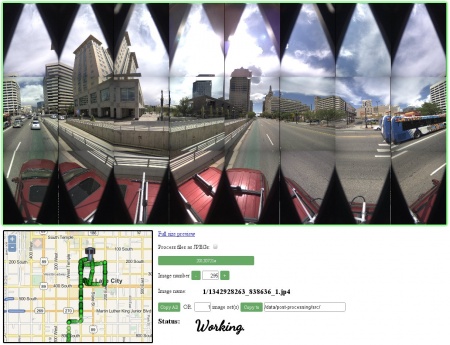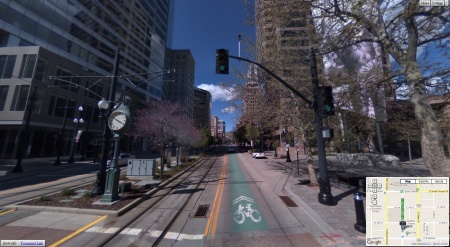Eyesis4Pi data structure
Contents
Intro
Eyesis4Pi stores images and gps/imu logs independently.
| Data | Stored on | Comments |
|---|---|---|
| Images | Host PC or (9x) internal SSDs (if equipped) | |
| IMU/GPS logs | Internal Compact Flash cards (2x16GB) |
IMU/GPS logs
Description
A sensor's log is a list of registered events from various sources:
- Trigger for starting image exposure (fps)
- IMU sentence received (2460 samples per second)
- GPS sentence received (5 samples per second) - in NMEA or other configured format.
Logs are stored in a binary format to have smaller size. Also, there's a file size limit - when it's reached a new file with an auto-incremented index will be started.
Raw logs examples
All the raw *.log files are found here
Parsed log example
parsed_log_example.txt (41.3MB) at the same location
[localTimeStamp,usec]: IMU: [gyroX] [gyroY] [gyroZ] [angleX] [angleY] [angleZ] [accelX] [accelY] [accelZ] [veloX] [veloY] [veloZ] [temperature] [localTimeStamp,usec]: GPS: $GPRMC,231112.8,A,4043.36963,N,11155.90617,W,000.00,089.0,250811,013.2,E [localTimeStamp,usec]: SRC: [masterTimeStamp,usec]=>1314335482848366 [localTimeStamp,usec]=>1314335474855775
Tools for parsing logs
Download one of the raw logs.
- PHP: Download read_imu_log.php_txt, rename it to *.php and run on a PC with PHP installed.
- Java: Download IMUDataProcessing project for Eclipse.
Images
Samples
Description
The pictures from each image sensor are stored in 8 triplets (because 3 sensors are connected to a single system board for the 24-sensor equipped camera) in the RAW JP4 format. ImageJ plugin deals with the triplet structure and does all reorientation automatically.
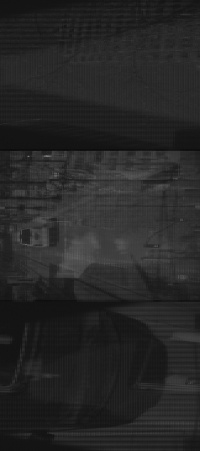 JP4 file opened as JPEG - sample from the master camera. Download original JP4 Open in an online EXIF reader |
File names
Image filename is a timestamp of when it was taken plus the index of the camera (seconds_microseconds_index.jp4):
1334548426_780764_1.jp4 1334548426_780764_2.jp4 ... 1334548426_780764_9.jp4
EXIF headers
The JP4 images from the 1st (master) camera have a standard EXIF header which contains all the image taking related information and is geotagged. So the GPS coordinates are present in both the GPS/IMU log and the EXIF header of the 1st camera images. Images from other cameras are not geotagged.
- Open the image from the master camera in an online EXIF viewer.
- Open the image from the secondary camera in an online EXIF viewer.
- The coordinates can be extracted from the images with a PHP script and a map KML file can be created.
Post-Processing
Requirements
- Linux OS (Kubuntu preferably).
- ImageJ.
- Elphel ImageJ Plugins.
- Put loci_tools.jar into ImageJ/plugins/.
- Put tiff_tags.jar into ImageJ/plugins/.
- Hugin tools - enblend.
- ImageMagick - convert.
- PHP
- Download calibration kernels for the current Eyesis4Pi. Example kernels and sensor files can be found here(~78GB, download everything).
- Download default-config.corr-xml from the same location.
- Download footage samples from here.
- Processed files are available for downloading from here (ready for the stitching step).
- Stitched results are found here.
Instructions(subject to changes soon)
- Launch ImageJ -> Plugins -> Compile & Run. Find and select EyesisCorrection.java.
- Restore button -> browse for default_config.corr-xml.
- Configure correction button - make sure that the following paths are set correctly (if not - mark the checkboxes - a dialog for each path will pop up):
Source files directory - directory with the footage images Sensor calibration directory - [YOUR-PATH]/calibration/sensors Aberration kernels (sharp) directory - [YOUR-PATH]/calibration/aberration_kernels/sharp Aberration kernels (smooth) directory - [YOUR-PATH]/calibration/aberration_kernels/smooth Equirectangular maps directory(may be empty) - [YOUR-PATH]/calibration/equirectangular_maps (it should be created automatically if the w/r rights of [YOUR-PATH]/calibration allow)
- Configure warping -> rebuild map files - this will create maps in [YOUR-PATH]/calibration/equirectangular_maps. Will take ~5-10 minutes.
- Select source files -> select all the footage files to be processed.
- Process files to start the processing. Depending on the PC power can take ~40 minutes for a panorama of (24+2) images.
- After processing is done there is only the blending step - the following script scans directory for *.tiffs from ImageJ and uses enblend(to stitch into 16-bit tiffs) and convert them into jpegs, in terminal:
php stitch.php [source_directory] [destination_directory] - no slashes in the end of the paths
Previewer
Note: This step is done independently from the processing and is not necessary if all the footage is to be post-processed. Just needs a KML file generated from the footage.
Here's an example of previewing the footage (works better in Firefox). If used on a local PC requires these tools to be installed.
Stitched panoramas Editor/Viewer
